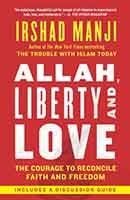Irshad Manji's The Trouble With Islam was a wake-up call to the Muslim world, calling for a reform away from religious oppression and toward greater personal freedom. That book posed the problem, and in this follow-up, she moves on to the solution by explaining how she has fused Islam with liberty and love in her own life.

Allah, Liberty and Love
Irshad Manji
ISBN: 145164521X
Free Press, 2011-06-14
English
Irshad Manji's "The Trouble With Islam" was a wake-up call to the Muslim world, calling for a reform away from religious oppression and toward greater personal freedom. In this follow-up, she moves on to the solution by explaining how she has fused Islam with liberty and love in her own life. A great book that contained an unexpectedly revealing question. (5/5)
It is said that while the customers never know what they want, they always know what they don't want. Many critiques end up the same way; but Irshad Manji is about to buck the trend. The Trouble With Islam was written in a white-hot state of anger, detailing what Manji didn't like about contemporary Islam. The follow-up is a follow-through where Manji nails seven points to the wall like a Muslim Martin Luther:
Some things are more important than fear
Identity can trap you, but integrity will set you free
Culture is not sacred
You define your honor
Offense is the price of diversity
In times of moral crisis, moderation is a cop-out
Lack of meaning is the real death threat
These points are explored in seven "lessons", consisting of a discussion centered on the point where it is exemplified by stories from Manji's and others lives. The examples often consist of email exchanges between Manji and either supporters or critics (or, for that matter, fanatics who want her dead).
The main point of the book is the same as in The Trouble With Islam: Tribal culture is strangling the intellectual vitality of the global Muslim community. The lessons, then, aim to inspire the reader to break out of the stranglehold and provide them with the intellectual means to do so. Accompanying the book is a mobile application with chapter summaries and videos[a].
Coming from a liberal, atheist background, the cultural context could not be more different; nevertheless I found the book a good read. The more one reads about forced conformity, the more one sees it in ones own life. Because we see what we expect to see, there is a risk that as soon as you learn of something, you start seeing the world through a lens where the "pattern" you have learnt ends up being seen everywhere. For example, an economist may see absolutely everything as an economic transaction; love, for example is conceptualized as a transaction where "emotional capital" is exchanged. An anti-racist runs the risk of seeing normal human failings as subversive, carefully camouflaged instances of racism.
But one point lodged in my brain. At the end, the reader is asked to complete a set of five statements[b]. One of them is "If I say what I think, the worst that can happen is...". I spent some time coming up with a suitably flippant answer, going from "nothing" over "nobody listening" before I settled on "someone I practically never meet anyway might de-friend me on Facebook". I had a grin on my face, thinking I had snarkily captured my own privileged state of not having to fear anything.
Then I realized I had, in fact, held back from speaking my mind, on Facebook, because I didn't think it worth upsetting a person that I practically never meet; and the grin was immediately wiped from my face.
I have had some time to think this over, and the conclusion is the same. I have gone through the decision process step by step in retrospect, and can only confirm that it was the risk of offending that tipped the balance to silence. It wasn't that the issue wasn't important enough, because the amount of offense wouldn't be that much either. It also wasn't because I wasn't sure enough of my position, because I was. It was simply that I preferred to not rock the boat. It also wasn't because commenting on the issue would turn me into an insufferable whiner, because obviously the original poster thought the issue was important enough to splatter into my news feed and thereby risk offending me.
I'll now be working my way down to zero friends. It'll take time, but I'm sure the result will be worth the effort.
I'd say the book was worth a good "five out of five" for that moment alone. However, even the Sun has its spots, and sometimes the book is sometimes a bit long on witty banter between Irshad and her opponents. I agree that it is good to "know your opponent", how they express themselves and how they react to certain (mild) provocations. But it's really not that hard to figure out which insults will be thrown at you - after all, when we get to insults, we're not dealing with the smartest people - and the strategy is the same: just ignore the insults.
In summary, then: Read this book[c]. If you can't read the book: Read the app[d]. If you can't read the app: Read Faith Without Fear[e]. If you can't read Faith Without Fear: Join Irshad Manji on Facebook[f]. If you can't join Irshad Manji on Facebook: Read through Irshad's website[g].
...and if you can't get to Irshad's website: Just keep on fighting the good fight any way you can.